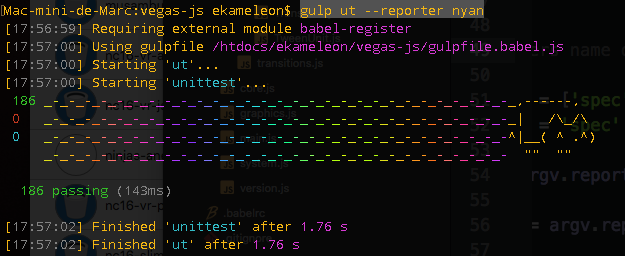VEGAS JS
Vegas JS - version 1.0 is an Opensource Framework based on ECMAScript for develop crossplatform Rich Internet Applications and Games.
This project contains a set of libraries writing in Javascript and based on the ES6 standard :
| package | description |
|---|---|
| core | The core package is specialized in functions utilities that are highly reusable without creating any dependencies : arrays, strings, chars, objects, numbers, maths, date, colors, etc. |
| system | The system package is the root for the VEGAS JS framework. It is the starting point of our RIA framework structure : signals, W3C events, datas and collections (ADT), IoC container (Dependency Injection), logger, tasks, transitions, logics, rules, models, etc. |
| graphics | The graphics library is an intuitive graphics API to manipulate all display objects in your applications. Offers a lot of powerful functionality to create and work with graphics, colors and geometrics objects, all neatly wrapped up in a well designed, consistent and clean programming interface. |
About
- Author : Marc ALCARAZ (aka eKameleon)
- Mail : ekameleon[at]gmail.com
- Link : https://www.ooopener.com
License
Under tree opensource licenses :
Resources
⌜ Download
Download on Bitbucket the latest code, report an issue, ask a question or contribute :
⌜ Documentation
Get started with the the Vegas JS API :
⌜ Tutorials
These tutorials helps you to understand the VEGAS JS Framework philosophy.
- system.transitions : Creates animations and tween effects in your projects.
⌜ Slack Community

Send us your email to join the VEGAS community on Slack !
Install
⌜ YARN / NPM
You can install VEGAS JS with NPM or Yarn.
yarn add vegas-js --devor
npm install vegas-js --save-dev⌜ Bower
bower install vegas-jsBuilds
VEGAS JS use Gulp and Yarn with a serie of powerful packages (Babel, Mocha, etc.) to build.
⌜ Simple Build
1 - The first time, clone the VEGAS JS repository
2 - Initialize the project
yarnNote: See the gulpfile.babel.js file at the top of the project folder.
3 - Build the binaries (vegas.js and vegas.min.js), the unit tests and the documentation.
gulp⌜ Unit tests
We use the Mocha and Chai (http://chaijs.com/) tools to run the unit tests of the VEGAS JS libraries.
gulp utor watch your modifications with :
gulp watch:utNote : You can use the two options --entry, --match and --reporter in the unit tests gulp task.
The --entry option trigger the a specific unit test entry. By default the unit tests engine target the ./tests/main.js file, you can for example target a specific with the command :
gulp ut --entry core.mathsor
gulp ut --entry core.maths.wrapThe --match option trigger the unit test engine (based on Mocha) to only run tests matching the given pattern which is internally compiled to a RegExp, for examples :
gulp ut --match graphicsRun all the graphics package unit tests.
gulp ut --match graphics.CardinalDimensionRun only the graphics.CardinalDimension unit tests.
The --reporter option define the unit test result rendering in the terminal with the values : 'spec', 'dot', 'landing', 'dot', 'nyan', 'list', 'mochawesome'. By default the 'spec' value is used.
gulp ut --reporter nyan
If you use the 'mochawesome' reporter, gulp generate in the './bin/tests' folder an HTML page who contains all the unit tests. For more informations, read the official documentation of Mochawesome.
gulp ut --reporter mochawesome⌜ Generates the documentation
The documentation of the framework is based on JSDoc.
Run the documentation build with gulp :
gulp docThe documentation is generated in the main project folder : ./docs
History
- 1998 : Flash
- 2000 : First framework concept and first libraries (components, tools, design patterns)
- 2004 : First official SVN repository
- 2007 : Fusion with the Maashaack framework (eden, etc.)
- 2015 : Google Code must die - VEGAS move from an old Google Code SVN repository to this Bitbucket GIT repository and REBOOT this source code.
- 2016 : Begin the new JS architecture of the VEGAS JS library based on ES6